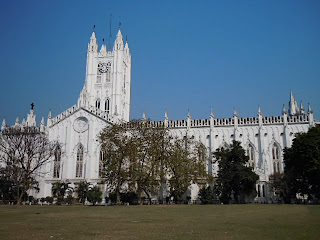Belur Math: Founded by Swami Vivekananda in the memory of Ramakrishna Paramahansa, Belur Math is one of the finest examples of modern temple architecture (which is a perfect blend of temple, church and mosque) in India. It’s inspired on Swamiji’s philosophy of universal brotherhood. The place has great historical significance – Vivekananda spent his last years over here. Add to this, the tranquility of its surroundings with the view of the river Ganges gently caressing the temple garden in the early morning sun. One can easily imagine Vivekananda in deep meditation under one of the ancient trees in the beautiful monastery.
Open on all days: 6:30 am-11 am and then 3:30 am-7:00 pm; Photography prohibited
Victoria Memorial: The stately monument is as much part of Kolkata as Taj mahal is to Delhi (Agra). Its closeness with the Taj made Victoria Memorial known as the “Taj of the Raj.” Surrounded by acres of lush garden, Victorial Memorial with its Italian Renaissance style architecture is still mesmerizing, especially on moon-lit nights. If you are interested in royal portraits (Queen Victoria and others), the Royal Gallery housed inside the monument is where you should head for. But the gallery which draws the most footfalls is a recent addition – the Calcutta Gallery. It has some beautiful paintings that give glimpses of life in British era –‘White Town’ and ‘Black town.’

Memorial: Sound and Light show (in English) Oct to Feb (7:15 pm-8pm); March to June (7:45pm-8:30pm)
Kolkata Race Course: Since 1819, Kolkata Race Course at Hastings has been one of the largest and prime destinations for horse racing in India. Maintained by the Royal Turf Club, it includes five racing tracks, polo grounds, a golf course and a lake. During racing season, the atmosphere in the 30,000 capacity galleries crackles with excitement as members and non-members from all walks of life (from dressed-up celebrities and industrialists to college students in their jeans and tees) rub shoulders with each other and bet on their favorite horses. Though it’s open on all days, visiting on any racing day is all that more fun. Undoubtedly, December is considered as the best time to visit the race course, not just for the cool climate but also for the sheer number of racing events geared up for the season.
Racing season: Nov till March and July till Sept
Jorasanko Thakurbari: Located in Dwarakanath Tagore Lane, off Rabindra Sarani (formerly, Chitpur road), is the famous ‘Thakurbari’ where India’s most revered poet and philosopher Rabindranath Tagore was born. If you want to find out about the great poet and his work, there couldn’t be a better place than Rabindra Bharati museum located inside the Thakurbari except for Shantiniketan (built by Kabi Guru himself) at Birbhum district in West Bengal. The museum has three galleries – one solely dedicated to Tagore and his extraordinary range of work, while the other two focuses on Tagore family and the stalwarts of Bengal Renaissance. Best time to visit Thakurbari is on May 7th when the place gets all decked up every year to celebrate the poet’s birthday.
Museum: Sound & Light Show (English): Feb to June (8pm-8:40pm) ; Nov to Jan (7 pm-7:40pm); Closed on Mondays and Thursdays; Entry Fee is applicable
Science City: Situated along the Eastern Bypass, is the Science City– Kolkata, hailed as the largest science hub of the Indian subcontinent. But you don’t need to be a science buff to enjoy this place! The ambiance is cool and attractive with well maintained flower beds and lawns. But the biggest crowd-puller is the Space Odessey which houses a sprawling space theatre. But don’t forget to drop in at the other attractions – Maritime Centre (an impressive two-storied building that replicates a ship), Dynamotion Hall or taking a theme tour of the evolution park. You would be surprised just how fast time flies by when you are in this amazing place.
Science City: All days: 9 AM to 9 PM; For details: http://www.sciencecitykolkata.org.in/
Nandan: Strategically located behind Rabindra Sadan (prominent Bengali cultural center and auditorium), is the state-of-the art cine complex where movie lovers in Eastern India celebrate the biggest movie festival – the Kolkata Film Festival. What you may not know is, Nandan is also a popular hang-out zone for budding artists, intellectuals, lovers or just anyone who has an opinion about something! For students of film and media studies, checking out the Satyajit Ray Film Archive or browsing through the well stocked library at the Ritwik Memorial Library (for cinematic research) could be very rewarding.

Nicco Park: If you are planning a day out with your family or friends, Nicco Park would be your best choice. While variety of rides (Cave ride, Water Coaster, Flying Saucer, Pirate Ship, etc.) ensure that children remain engaged, adults can spend a relaxing day stretching out on its vast green or just strolling around. There is also a food park to satiate your hunger with delicious South Indian, North Indian, Bengali or Chinese fast food options.
Kalighat Temple: The age-old Kalighat temple might have been in Kolkata since the Gupta period, though there is nothing to substantiate it. But the fact that it is one of the 51st Peeths of the Goddess Kali makes it one of the holiest places and evokes the deepest devotion from pilgrims across India. For those who want to make a special offering to the mother Goddess, Thursdays and Saturdays are the days to visit. Otherwise the temple is open on all days.
Marble Palace: It is truly extraordinary of Raja Rajendralal Mullick, a zamindar in Bengal, to build such a jaw-dropping marble architecture way back in 1840 and, that too, dedicate it to arts! Located at Muktaram Babu Street on C.R. Avenue, Marble Palace is believed to preserve some original works of world renowned painters like Peter Paul Rubens and Sir Joshua Reynolds. But the biggest USP is its fluted columns and sculptures of Jesus, the Virgin Mary, the Buddha and Hindu Gods all in one place.
Timing: 10am-4PM; Mondays and Thurdays closed; Photography prohibited
As you see, there are many places that have not made it to the list. But that doesn’t make them any less deserving, just the scope of the article doesn’t allow them this time. When you next visit Kolkata, don’t be surprised if you find a whole new list to begin with! Leaving you on that promise till the next time…

Navigator
Getting There
Kolkata is well connected with major Indian cities like Ahmedabad, Bangalore, Bhubaneswar, Chennai, Delhi, Hyderabad, Lucknow or Mumbai by air, road and rail. Netaji Subhash Chandra Bose International Airport is at Dum Dum, just 17 kms away from the city heart. Kolkata has two main railway stations – Sealdah station and Howrah station. The main bus station is Esplanade Terminus in the city heart.
Where to Stay
Kolkata offers a wide range of options in hotels:
Best Inn Hotel (Tel- 91-033-2454-9101/2454-9190);
email-thebestinn@gmail.com
Swissotel Kolkata ( Tel-91-033- 6626 6666/6626 6626;
email- reservations.kolkata@swissotel.com) or a decent option on limited budget like
Hotel Trimoorti (Tel- 91-033-2486 8572 or +91 90513 26104; email: booking@hoteltrimoorti.com)











